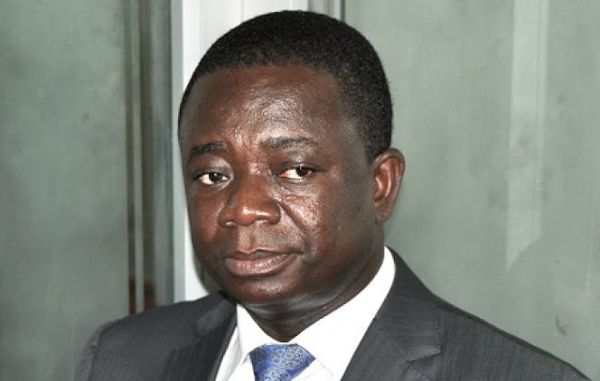
Opuni’s trial: Lawyer questions integrity of witness
The integrity of the first prosecution witness in the trial of a former Chief Executive Officer of the Ghana Cocoa Board (COCOBOD), Dr Stephen Kwabena Opuni, was yesterday questioned by a defence counsel at the Accra High Court.
Mr Benson Nutsukpui, lawyer for Seidu Agongo, the second accused person, had asked the witness, Dr Franklin Manu Amoah, the Executive Director of the Cocoa Research Institute of Ghana (CRIG), if he had ever been compromised in his line of duty.
Dr Amoah had earlier told the court in his evidence-in-chief that Dr Opuni, during his time at COCOBOD, had instructed scientists at CRIG, which is under the control of COCOBOD, to shorten the testing period for fertilisers.
As a result of the said instruction, the witness said, CRIG shortened the testing period for Lithovit Forliar Fertiliser (LFF), the fertiliser which is the subject of the trial, from two to six months.
Cross-examination
During cross-examination of the witness, Mr Nustupkui sought to make a case that what Dr Amoah had told the court was different from what he (Dr Amoah) had told a committee that was set up to investigate activities of COCOBOD.
Counsel said the witness had told the committee, known as the Dr Yaw Adu-Ampomah Committee, that he (witness) was never influenced by Dr Opuni’s directives in taking decisions.
“Have you ever been influenced by any other thing apart from your scientific knowledge and integrity in your work’’ counsel asked.
“No,” the witness replied.
“Did you confirm to the Adu-Ampomah Committee that you were not influenced by Dr Opuni’s directive in taking your decisions’’ counsel asked.
In his response, Dr Amoah said Dr Opuni was his boss and therefore, the decision to reduce the testing period of agrochemicals was in compliance with Dr Opuni’s directive.
“Answer my question. Did you confirm to the committee that you were not unduly influenced by Dr Opuni’s directive’’ Mr Nutsupkui asked again.
The witness answered that he had told the committee that the shortening of the testing period for agrochemicals was in compliance with Dr Opuni’s orders, but he only did that after several attempts to persuade Dr Opuni to change the directive had failed.
Mr Nutsupkui further asked questions on the efficacy of the LFF.
Dr Amoah responded that he did not remember what counsel was talking about.
Counsel first asked the witness if he remembered any meeting that he (Dr Amoah) had with certain officials of CRIG and COCOBOD during which one official disputed claims by another official that farmers had complained that the LFF was not effective.
“I don’t remember,’’ Dr Amoah answered.
Mr Nutsupkui then asked Dr Amoah if he recalled one of the officials saying that farmers had indicated that the LFF had increased cocoa yields and, therefore, they preferred it to other types of fertiliser.
The witness answered that since he had already stated that he did not remember the said meeting, he could not recall what the said official said.
Hearing continues on October 29, 2018 at the court, presided over by Mr Justice Clemence Honyenuga.
The prosecution is expected to call its second witness.
Case against
Opuni and Agongo
In March 2018, the Attorney-General charged Opuni and Agongo with 27 counts for engaging in illegalities that caused financial loss of GH¢271.3 million to the state and led to the distribution of substandard fertiliser to cocoa farmers.
According to the A-G, Dr Opuni, during his tenure as COCOBOD CEO (November 2013 to January 2017), breached laid down procedures in procurement and other laws that led the state to lose GH¢271.3 million in the alleged fertiliser scandal.
Agongo is also alleged to have used fraudulent means to sell substandard fertiliser to COCOBOD for onward distribution to cocoa farmers.
The two accused persons have denied any wrongdoing and have pleaded not guilty to all the 27 charges.
They are currently on bail in the sum of GH¢300,000 each.
Writer’s email:
